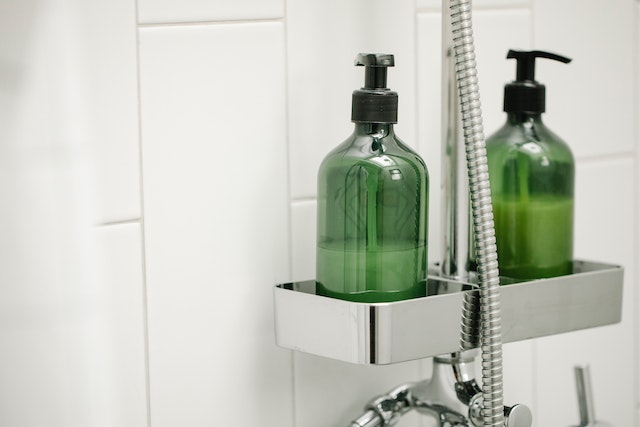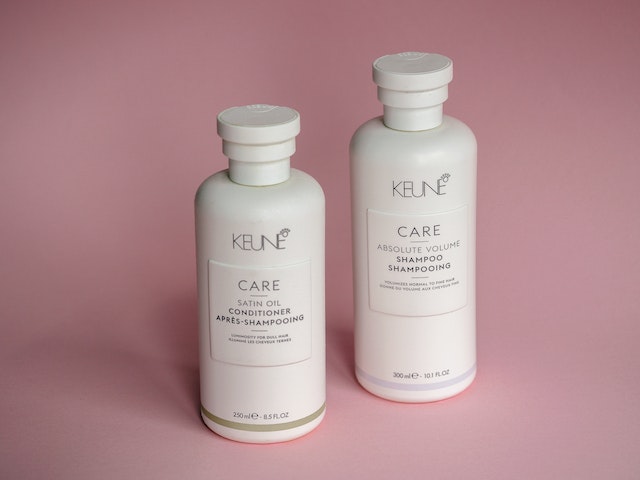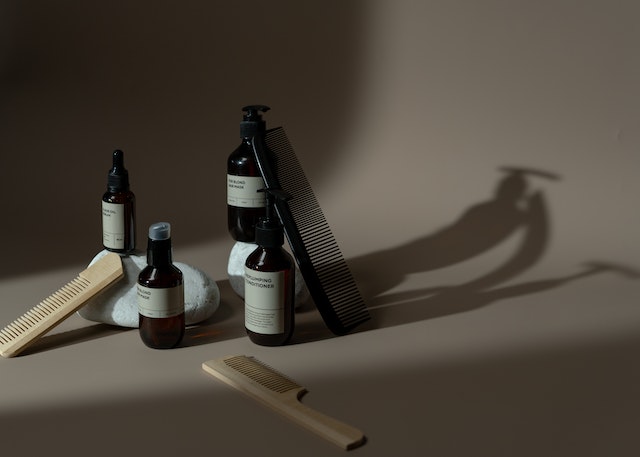To sum it up, hydrating and moisturizing shampoos are both essential for maintaining healthy hair. While hydrating shampoo focuses on adding moisture to the hair, moisturizing shampoo is best suited for those with dry or damaged locks.
Hydrating Shampoo
(Photo by Sarah Chai)

Hydrating shampoo is specifically designed to infuse moisture into your hair. This type of shampoo is ideal for individuals with dry, brittle or damaged hair that needs a boost of hydration. Hydrating shampoos are formulated with ingredients like hyaluronic acid, glycerin and panthenol that penetrate deep into the strands to provide intense moisturization.
One of the key benefits of using hydrating shampoo is that it can help improve your hair’s elasticity, making it less prone to breakage or split ends. Additionally, hydrating shampoos can also reduce frizz and make your hair look smoother and shinier.
It’s important to note that if you have oily or fine hair, you may not need a hydrating shampoo as often as someone with thicker or drier locks. In this case, it’s best to use a hydrating conditioner instead.
Incorporating a hydrating shampoo into your regular hair care routine can be incredibly beneficial for achieving healthy-looking tresses!
Moisturizing Shampoo
Moisturizing shampoo is a hair care product that helps to add moisture to dry and brittle hair. It contains ingredients such as natural oils, shea butter or glycerin that help in restoring lost moisture to hair strands. This type of shampoo is perfect for those with curly, coily or kinky hair types, which are prone to becoming dry due to the nature of their texture.
Moisturizing shampoo can also be beneficial for individuals who use heat styling tools regularly since these tools strip the natural oils from our scalp and leave our strands parched. Using moisturizing shampoos will help prevent breakage by reducing friction between strands during combing.
It’s important to note that not all moisturizing shampoos are created equal. Some may contain harsh sulfates that could further damage your already delicate tresses. Therefore, always read labels carefully before purchasing any product.
Incorporating moisturizing shampoo into your routine is an excellent way of keeping your locks healthy and hydrated while preventing split ends and breakage caused by dryness.
Hydrating shampoo Vs. Moisturizing shampoo – Key differences
When it comes to hair care, one of the most commonly misunderstood terms is “hydration” vs. “moisture.” While these two words are often used interchangeably, they actually refer to different things.
Hydrating shampoos are designed to add water and moisture into the hair shaft. These shampoos typically contain ingredients like hydrolyzed wheat protein or aloe vera that can penetrate the hair cuticle and infuse your strands with hydration. Hydration is important because it can help improve elasticity and reduce breakage.
On the other hand, moisturizing shampoos work by sealing in existing moisture within your hair cuticles. They generally contain ingredients like shea butter or coconut oil which create a barrier around each strand, locking in moisture and preventing dryness from occurring.
The key differences between them are:
Hydration vs. Moisture: The primary difference between hydrating and moisturizing shampoos is the type of nourishment they provide to your hair. Hydrating shampoos help to infuse moisture into the hair strands, while moisturizing shampoos help to lock in moisture and prevent dryness.
Hair Type: Hydrating shampoos are best suited for dry and brittle hair, while moisturizing shampoos work well for those with frizzy or curly hair. Hydrating shampoos are designed to add moisture to hair that lacks it, while moisturizing shampoos help to control frizz and enhance curl definition.
Ingredients: The ingredients in each type of shampoo are formulated to address different hair concerns. Hydrating shampoos typically contain ingredients such as glycerin, aloe vera, and hyaluronic acid, which help to attract and retain moisture in the hair. Moisturizing shampoos may contain ingredients like shea butter, jojoba oil, or coconut oil, which help to nourish and protect the hair from damage.
Result: Hydrating shampoos leave your hair feeling more supple, soft, and manageable, while moisturizing shampoos leave your hair feeling smoother and more hydrated.
If you have dry, brittle hair that lacks moisture, a hydrating shampoo would be the best choice. If you have frizzy or curly hair that needs extra moisture to prevent dryness and control frizz, a moisturizing shampoo would be a better option.
How often should you use hydrating/moisturizing shampoo?
(Photo by Natallia Photo)

When it comes to how often you should use hydrating or moisturizing shampoo, there is no one-size-fits-all answer. It all depends on your hair type, the climate you live in, and your styling habits.
If you have dry or damaged hair, using a moisturizing shampoo once or twice a week can help restore moisture and prevent further damage. On the other hand, if your hair tends to be oily or fine, using a hydrating shampoo too frequently may weigh down your locks.
It’s also important to consider the humidity levels in your area. In more humid climates, hair can become frizzy and lose moisture quickly. In this case, using a moisturizing shampoo more frequently may be necessary for optimal hydration.
Your styling habits are another factor to consider. If you regularly use heat tools like blow dryers and straighteners or chemical treatments like coloring or relaxing agents, then weekly use of a hydrating/moisturizing shampoo is highly recommended to keep your strands healthy.
It’s best to listen to what your hair needs and adjust accordingly. Don’t be afraid to experiment with different frequencies until you find what works best for you!
How do I know if my hair needs moisture or hydration?
Determining whether your hair needs moisture or hydration is an important step when it comes to choosing the right shampoo. The easiest way to tell which one you need is by examining your hair’s texture and behavior.
If your locks feel dry, brittle, and frizzy, then they’re likely in need of some extra moisture. This could be a result of excess heat styling or exposure to harsh environmental factors such as wind and UV rays. A moisturizing shampoo that contains ingredients like shea butter, coconut oil, or argan oil can help restore hydration levels back to normal.
On the other hand, if your strands are limp and lackluster with no bounce or shine, this may indicate that you need a hydrating shampoo instead. Dehydration can occur due to factors like over-processing from coloring treatments or using hot tools frequently. Hydrating shampoos contain humectants like glycerin that attract water molecules into the hair shaft for optimal moisture retention.
It’s also worth noting that sometimes our scalp can become too oily which makes it prone to buildup and clogged pores leading to less effective washing results after showering even though we just used our regular routine products (shampoo & conditioner). In this case try adding clarifying treatment every few washes so not only will you keep everything clean but also prevent from any dandruff issues created by excessive sebum production on top of all these problems mentioned before!
Ultimately determining what kind of product works best for your particular hair type requires trial-and-error experimentation until you find something that yields satisfying results!
What is the best hair care routine?
Having a good hair care routine can help keep your locks healthy, shiny and beautiful. But with so many products out there, it can be hard to figure out which ones are right for you.
Firstly, it’s important to start with a gentle shampoo that won’t strip your hair of its natural oils. Look for one that is sulfate-free and contains natural ingredients like coconut or argan oil.
After shampooing, follow up with a conditioner that is suited to your hair type. If you have dry or damaged hair, opt for a deep conditioning treatment once a week.
When blow-drying or using heat styling tools on your hair, always use a heat protectant spray to prevent damage and breakage.
Incorporating regular scalp massages into your routine can also help improve blood flow and promote healthy growth.
Don’t forget about trimming! Regular trims every 6-8 weeks will keep split ends at bay and ensure that your hair stays looking fresh and healthy.
The benefits of moisturizing shampoo
Moisturizing shampoo has become a popular choice for people with dry, brittle or damaged hair. One of the benefits of using a moisturizing shampoo is that it helps to replenish lost moisture in your hair. This type of shampoo contains ingredients like shea butter, coconut oil and argan oil that penetrate deep into the hair shaft.
Using moisturizing shampoo regularly can also help to prevent breakage and split ends. It strengthens your strands by providing them with essential nutrients and oils they need to stay healthy. You’ll notice fewer tangles and less frizz when you use a moisturizing shampoo.
Another great benefit of this type of product is that it can improve the overall texture of your hair. If you have naturally curly or wavy locks, moisturizing shampoo will define those curls while reducing frizz at the same time.
If you color-treat your hair frequently, then using a moisturizing shampoo can help preserve its vibrancy longer. The added hydration will protect against fading caused by harsh chemicals found in many dyes.
The benefits of hydrating shampoo
Hydrating shampoo is specifically designed to infuse moisture into dry and brittle hair. It has several benefits that make it a popular choice for individuals with parched locks. Firstly, hydrating shampoo can help improve the look and feel of your hair by restoring its natural texture and shine.
Another advantage of using this type of shampoo is that it helps reduce breakage, split ends and frizz caused by lack of moisture in the hair strands. By nourishing each strand with hydration, you can expect less tangles and knots when brushing or styling your hair.
Moreover, hydrating shampoos are gentle on color-treated hair as they do not contain harsh chemicals that strip away the color pigments from your locks. This makes them an excellent option for those who want to maintain their vibrant shade without sacrificing their hair’s health.
In addition to these benefits, hydrating shampoos also provide a refreshing sensation on the scalp due to their cooling ingredients such as mint or tea tree oil which help soothe any inflammation or itchiness.
Featured Image By – Photo by cottonbro studio









